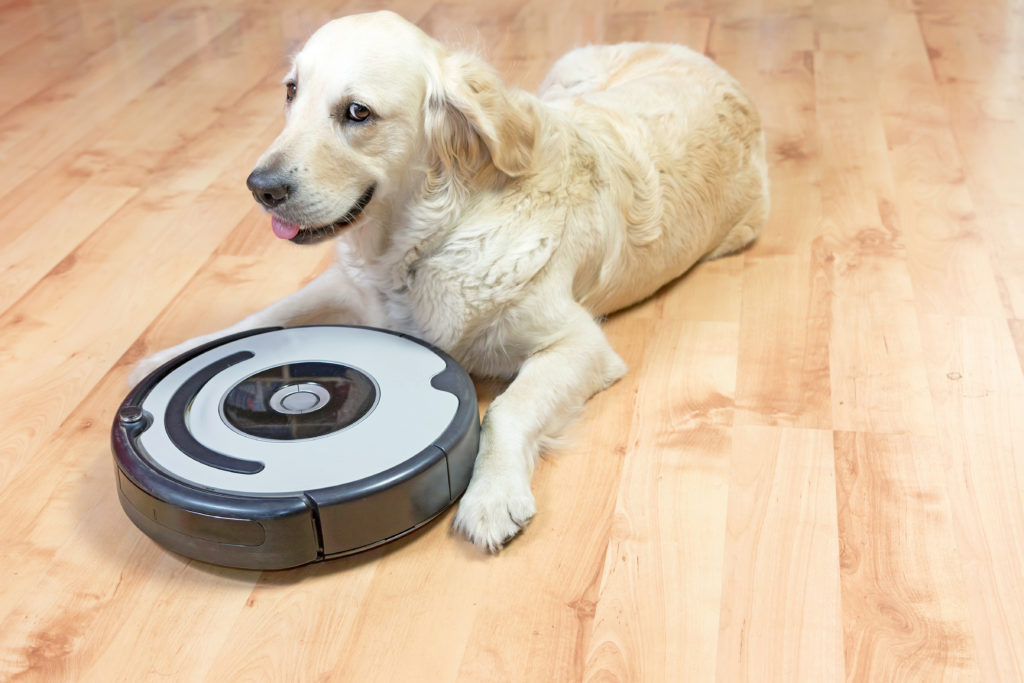Fear of the vacuum cleaner is surprisingly common among dogs, but can be very worrisome to some owners. If your pup hides, drools, urinates, barks, or attempts to escape when the vacuum is turned on, he is likely afraid of it. His fear probably is not the result of anything you are doing and there are a lot of reasons your dog could be afraid of vacuums. Some possibilities include:
- Noise: Vacuums are very noisy and can sometimes elicit a high pitched squeal. The sounds may bother your dog’s ears as his hearing is much more sensitive than humans.
- Lack of Exposure: If your dog was never introduced to vacuums in a slow, gradual way, he may be unsure of what to make of the machine, which is loud, big, and may appear threatening.

- Bad Experience: If your dog was previously exposed to a vacuum and had a bad experience, such as someone chasing him with a vacuum while it is on, that may manifest as a fear or phobia for your dog over time.
- Temperament: All dogs have their own unique disposition. If your dog generally tends to be quiet, fearful, and shy, not just around vacuums, then it is probably just his temperament.
- Instinct: If your dog’s reaction to the vacuum is barking and chasing it, then it’s possible that your dog isn’t afraid of the vacuum at all. Instead, he might be asserting his herding instinct and trying to get the vacuum back in line.
However, that is not a comprehensive list. There are an infinite number of explanations for your dog’s fear and since each dog is unique, it’s impossible to say what the exact reason and solution is for your dog. But you can help him!
Overcoming Vacuum Fear
When it comes to helping your dog overcome his fear of the vacuum, there are three general schools of thought: ignore, accommodate, or expose. Each has their benefits and detriments along with droves of people who can speak to the success or horror of each. It’s important to evaluate these options with your specific dog in mind. You know his temperament and past experiences best and can use that information to choose the best course of action.
Ignore
Much like it sounds, for this method all you do is ignore your dog’s fear and allow them to overcome it on their own. For this approach, it’s important that you do not deviate from your routine with the vacuum. Simply go about your business and allow your pup to do the same. After some time, he may begin to ignore the vacuum or lay on the couch in the same room while you vacuum.
Accommodate

This approach allows you to acknowledge your dog’s fear and to make arrangements that will help reduce his stress and anxiety. For example, if you recognize that your dog is afraid of the vacuum, you may choose to put him outside or in another room while you vacuum. This removes him from the situation and eliminates the cause of his fear. However, some may argue this does not actually help to overcome their dog’s phobia.
Expose
Finally, you may choose to expose your dog to the vacuum gradually. This could help your dog adjust to the presence of the vacuum and realize that his fear is unnecessary. To start, you may put your dog in the room with the vacuum while it was off. Then, gradually, you would begin to increase the proximity and exposure to the vacuum. You could put a treat on the vacuum and have your dog approach and remove it. You may then turn the vacuum on while your dog is in the room, progressing until your dog seems to be at ease around the cleaner.
This process takes time and can be very frustrating to some owners. Throughout the exposure process, it is important to remember not to punish your dog for his fear or panic as this will only increase his stress and intolerance for the vacuum.
Whatever method you choose, be compassionate with your dog. Just like you have fears, so does he, and finding the right method to help alleviate the fears may take time and patience. If, however, you have tried all methods for an extended period of time and your dog is still displaying signs of great distress, you should try a natural supplement.




